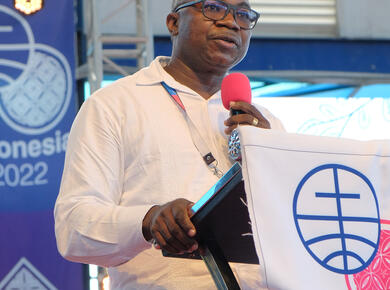Posted: December 30, 2022
Friday morning
Ephesians 2:14-17 “For he is our peace, in his flesh he has made both groups into one and has broken down the dividing wall, that is, the hostility between us. He has abolished the law with its commandments and ordinances, that he might create in himself one new humanity in place of the two, thus making peace, and might reconcile both groups to God in one body through the cross, thus putting to death that hostility through it. So he came and proclaimed peace to you who were far off and peace to those who were near…”
The varied global contexts characterized by polarized ideologies, culture, ethnicities, religions, technologies and economies – with their power structures that oppress societies – are what lead to war and all kinds of human rights violations. The hope of creating more just societies is frustrated, making reconciliation with God, nature and ourselves more difficult. In such circumstance it becomes possible to see the deep resentment in all its daily forms that occupies our human realities.
This reality demands that the Anabaptist church and other confessions and religious expressions urgently reconsider the importance of Christ’s gospel. The kingdom of God needs to be built in such contexts through reconciliation strategies that cross ethnic, economic, technological, religious, and cultural boundaries.
The apostle Paul was able to read the socio-political and religious situation between Jews and other first century societies well. He did so by virtue of his Judeo-Christian worldview informed by an understanding of Jesus’ ministry as the Son of God: breaking down the dividing wall, that is, the hostility between us… thus making peace.
Social dialogue becomes an essential tool for transforming society that has been forced to put up with incomprehensible wars for decades. The intentional and thoughtless practice of war has destroyed the social fabric and placed people’s ethnic and cultural identities at risk. War leaves ethnic, cultural and faunistic genocide in its wake that primarily affects the most vulnerable communities.
For instance, in Colombia, the groups most affected by the armed conflict have been Black and Indigenous communities in ethnic and collective territories. They have been coerced into abandoning their amicable relationship with their environment and social context. When this happened, the conflict led to drastic changes in how differences are resolved between people. The use of weapons became the context has forced sectors of society to use develop a shared vision for building peace through the use of social dialogue.
Social dialogue entails finding common ground that allows for finding practical solutions for living together peacefully, with the goal of embracing the humanity and reciprocity in each other. This idea flows from the Bantu word used in southern Africa and popularised by Nelson Mandela and Desmond Tutu: ubuntu, which means “I am because you are”. We exist because of a community.
In Colombia, we have a strategy that seeks to respond to these challenges. We have begun interethnic and ecumenical work from a collective worldview that is more than a theological and religious posture. We start with various processes that are community-based, using local know-how and capacity, with a respect for autonomy. In this way, we work toward concrete actions.
We serve as a space where inter-ethnic organizations and churches can connect and be strengthened as we support them in building and making their life-giving plans for peace visible in their territories.
Our work is centred around reconciliation processes, ethnic peace and local development, through strategic alliances between churches, government bodies, the private sector, regional peace platforms and international organizations.
Core strategy
Work in favour of holistic and sustainable ethnic community development in ethnic regions that facilitate linkages between base communities and regional organizations and peace agendas through dialogue that focuses on resolving conflict in local areas.
We use the following lines of action:
- Victims’ rights: Life, dignity and justice. Holistic reparation for victims of the armed conflict (includes truth, justice, reparation, assurances of non-repetition), full enjoyment of their rights, safe return to their local communities with dignity (education, health, shelter, security).
- Peace education: Spiritualities, cultures and territories. Training in citizenship, human rights, cultural identity and democratic participation, development of shared visions for the region, and nonviolent social and political conflict transformation.
- Citizenship participation guarantees. Local autonomy and self government. Strengthening direct, participative and representative democracy; consolidating multi sectoral citizen pacts and moving towards an inclusive political climate that respect the ethnic, social and cultural pluralities present in the nation.
- Production: Ethnic development and creation care. Guarantee food security and sovereignty from an ethnic and environmental sustainability perspective.
- Reconciliation: Spirit of dialogue and social collaboration. Reach agreements based on justice and social inclusion; open a path to the future through building relational networks of trust amongst diverse social actors, the private sector and government bodies. Justice, peace, development and reconciliation all require space for transforming conflict through dialogue, participation and social agreement with respect to policies that deliver well-being to communities
- Peaceful communication: This proposal is oriented toward strengthening the network of popular communicators so that they share, build and strengthen processes and communication skills rooted in afro, indigenous and mestizo communities that inhabit subregions of the country. Also, these communicators make actions related to peace building, historical memory, resistance, forgiveness, reconciliation and protection of the regions and their development visible.
— José Rutilio Rivas Domínguez is a Mennonite Brethren pastor, theologian, social enterprise entrepreneur and peacebuilder in Colombia, and a member of the MWC Mission Commission.



Join the Conversation on Social Media
FacebookTwitterInstagramFlickrYouTube